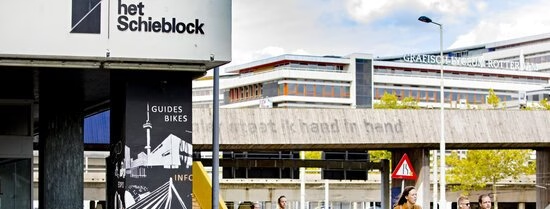Community centers offering insight at lectures about healthcare prevention or Essent supporting teachers during courses on an inclusive energy transition. Erasmus Verbindt matches local social organisations to educational programmes of EUR, Erasmus MC and TU Delft. This month they celebrated their 100th match. One of the founders and Programme manager Education Florian Wijker tells us about the past few years.
What exactly does Erasmus Verbindt do?
'We build a bridge between academic education and society, by connecting social partners to relevant educational programmes or lecturers within the university. We do this on the themes of sustainability, health and inequality. At Erasmus Verbindt, we work with student assistants from almost all faculties. They still have a connection with their education and know exactly what fits into an educational programme. That makes our approach very effective.'
So you reach out to these social organisations yourself?
'Absolutely. This is essential, especially for organisations that are not automatically connected to the academic world, such as community centers. We actively approach people and/or organisations who do not have an academic background. Otherwise, they simply will not find us.
Community centres work with local residents on a daily basis and have insight into healthcare issues. This is incredibly valuable for students, for example in research into health prevention or social inequality. If you involve a community center in an educational programme, students can conduct much more in-depth research than if they only conduct surveys. It provides more relevant insights and mutual value, because they work with real-life cases.'
Do you also collaborate with larger organisations?
'Certainly. In addition to community centers, we also work with parties that are involved in the inclusive energy transition, such as provinces or companies like Essent. They operate more at a policy level. We can easily switch between large and small organisations, which enables us to integrate various issues into education.'

It sounds more practical, even more like university of applied sciences (hbo)-education?
'I hear that more often. But I think this is essential for scientific education. Instead of just theoretically calculating models, you test them in practice. That makes education more relevant and strengthens scientific quality, precisely because students learn to deal with complexity.'
This month, the hundredth lecturer of this year joined Erasmus Verbindt. How do they experience this?
'Most lecturers respond very positively. For many of them it was surprising that university education can also be so interwoven into society. We offer a concrete space to do that, which many lecturers experience as valuable. And yes, it is sometimes intensive, especially because real-life cases involve much more nuance and complexity than fictitious assignments. But that is often where the deeper learning moment lies.'
And what do students get out of it?
'Students develop a more accurate view of reality. Whether it concerns doctors who learn how they can communicate better with patients or public administration students who discover why only 17% of people vote in local elections: it forces them to think outside the box. They learn to understand the real world and become better professionals.'
In her first year at our university, Assistant Professor Dr. Madeleine Meurer greatly appreciated the support she received from Erasmus Verbindt. She talks about her experience teaching, collaborating with social partners, and building a network in a new country.

How has Erasmus Verbindt help you settle into your teaching role?
'Erasmus Verbindt has been incredibly helpful, especially as someone new to the Netherlands. I have only been working at the university as an assistant professor for about 9 months, for the Master Global Business & Sustainability. When I started preparing my course on social entrepreneurship, the academic director of the Global Business & Sustainability Master suggested I get in touch with Erasmus Verbindt to find guest lecturers. This worked out beautifully. They connected me with three social entrepreneurs who participated in the course.'
What does the structure of your course look like, and how do the guest lecturers fit in?
'Each week includes a lecture that focuses on the theoretical perspectives of social entrepreneurship, and a practical group assignment based on a real-world case from one of our (in total eight) guest speakers. I develop these cases together with the entrepreneurs to make sure they align with the curriculum while also providing real value to the social enterprises.'
So students get hands-on experience with these local social partners?
'Exactly. They apply theory to real challenges, which gives them practical skills. Plus, it’s a two-way benefit: often these small social enterprises don’t have access to consultants. The students’ input is genuinely valuable to them.'
What has the student response been like?
'Very positive. Just today, a student told me how much she appreciated working on meaningful, real-life cases. Unlike theoretical exercises done just for a grade, these assignments carry real-world significance, which motivates students in a different way. They’re not just learning theoretical insights, they are actually contributing directly tot he social enterprises by applying these insights.'
Do you have any advice for other lecturers who might want to work with Erasmus Verbindt?
'Definitely speak to them directly. At first, I just emailed a general request, but once we had a proper conversation about my needs and the kind of guest lecturers I was looking for, things moved quickly. It’s also a fantastic opportunity to build your professional network, especially when, like me, you’re new to the country.'
- Assistant professor
- Related content
- Related education
- Related links
- More information about Erasmus Verbindt

